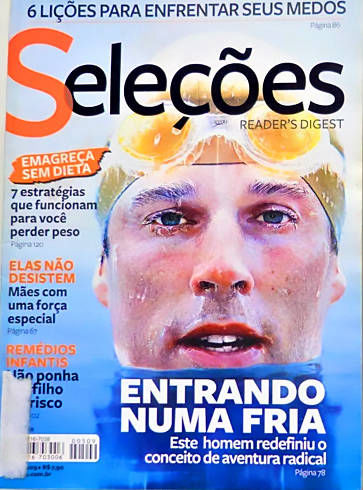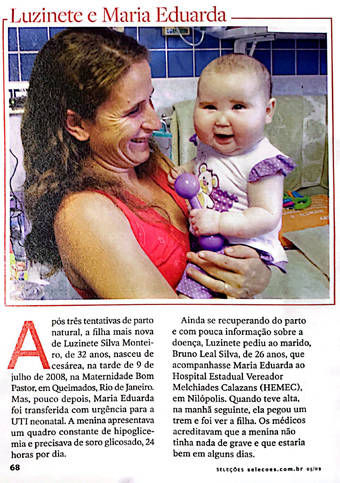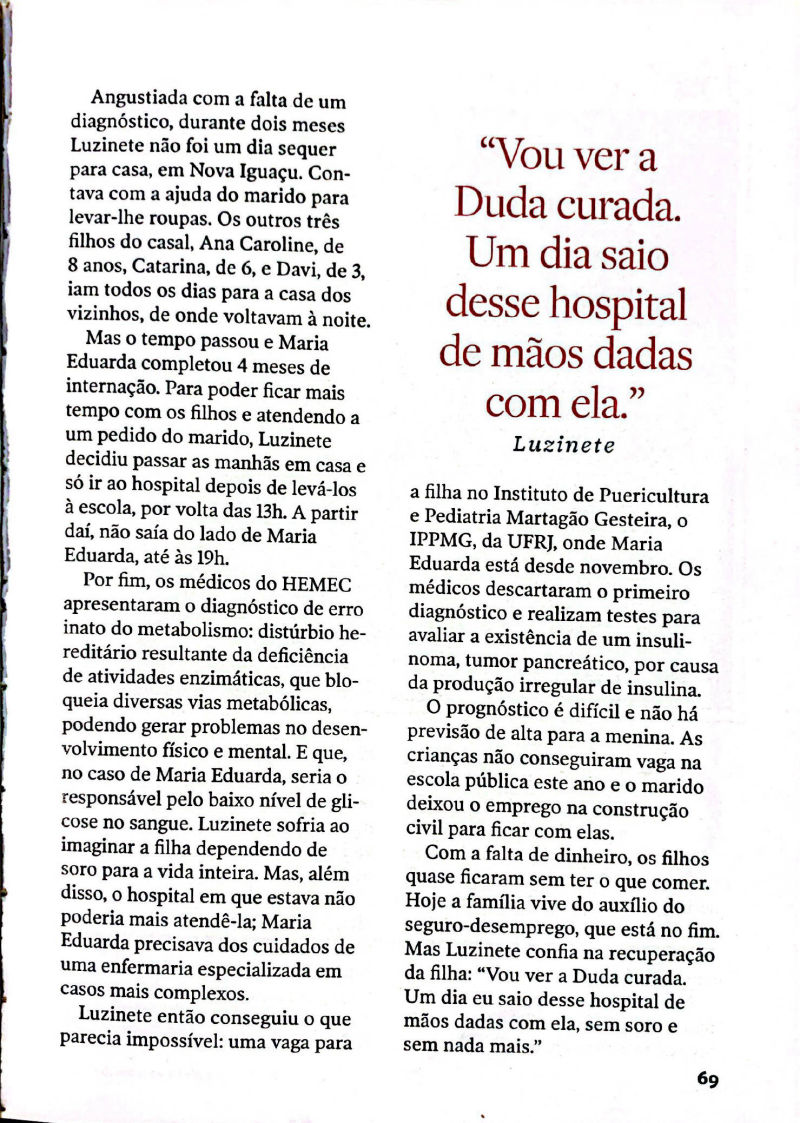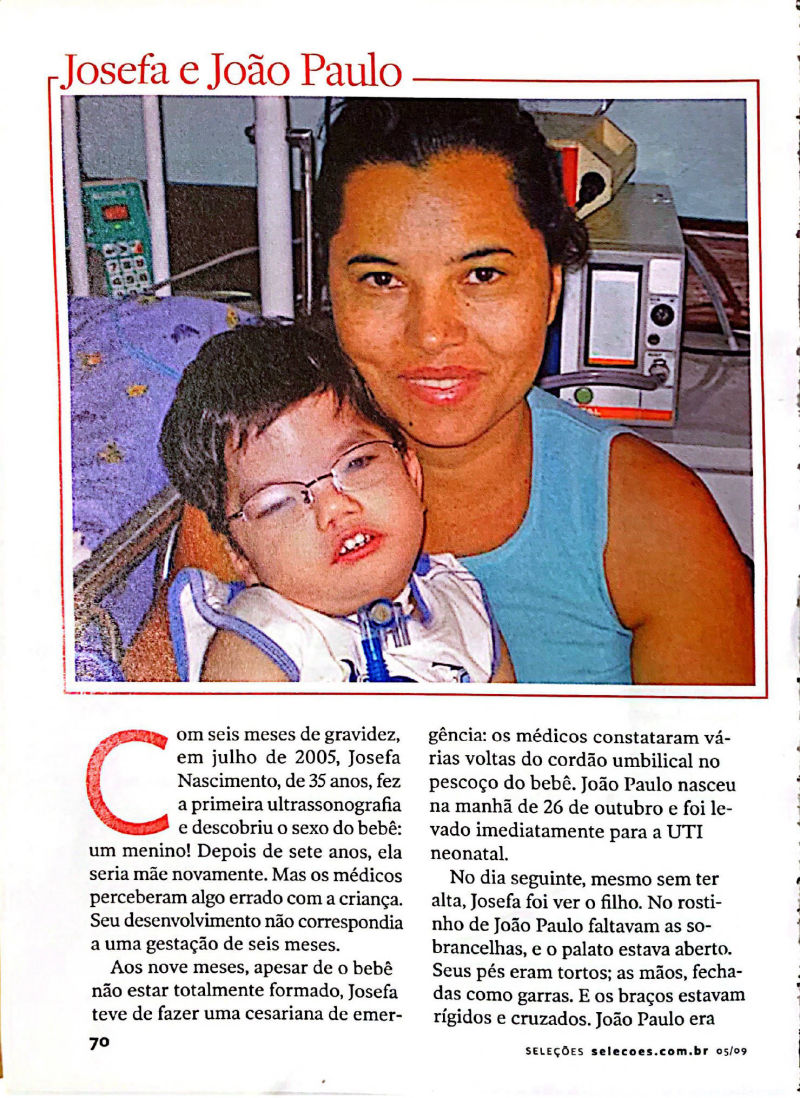Mother’s love
The story of two mothers who never lost hope.






Luzinete and Maria Eduarda
After three attempts at natural childbirth, the youngest daughter of Luzinete Silva Monteiro, 32, was born by cesarean section on the afternoon of July 9, 2008, at the Bom Pastor Maternity Hospital, in Queimados, Rio de Janeiro. But shortly afterwards Maria Eduarda went urgently to the intensive care unit of the Vereador Melchiades Calazans State Hospital (HEMEC), in Nilópolis. The girl had constant hypoglycaemia and needed glucose serum 24 hours a day.
Still recovering from childbirth and with little information about her daughter’s condition, Luzinete asked her husband, Bruno Leal Silva, 26, to accompany Maria Eduarda to the other hospital. When she was discharged the next morning, she took a train and went to see her daughter. Doctors believed the girl would be fine in a few days.
But 4 months went by, and Maria Eduarda was still in the intensive care. In order to spend more time with her children and husband, Luzinete decided to spend the mornings at home and only go to the hospital after taking the kids to school, around 1 pm. From then on, she didn’t leave Maria Eduarda until 7 pm.
Finally, the doctors at HEMEC presented the diagnosis of inborn error of metabolism: hereditary disorder resulting from the deficiency of enzymatic activities, which blocks several metabolic pathways, which can generate problems in physical and mental development. And for Maria Eduarda, that would be responsible for the low blood glucose level. Luzinete suffered when imagining her daughter depending on serum for her entire life. But things got even more difficult when the hospital where she was in could no longer attend to her; Maria Eduarda needed a ward specialised in complex cases.
Luzinete then got what seemed impossible: a place for her daughter at the renowned Instituto de Puericultura e Pediatria Martagão Gesteira, IPPMG, at UFRJ, where Maria Eduarda has been since November. Doctors have ruled out the first diagnosis and carry out tests to evaluate the existence of an insulinoma, a pancreatic tumor, because of irregular insulin production.
The prognosis is difficult and the girl is not expected to be discharged. Luzinete’s other children didn’t get a place in public school this year, and her husband had to quit his job in the construction market to stay with them at home.
With the lack of money, the children had nothing to eat. Today, the family lives with unemployment credit, which is running out. But Luzinete is confident in her daughter’s recovery: “I’m going to see Duda cured. One day I will leave this hospital hand in hand with her.”
Josefa and João Paulo
Josefa Nascimento, 35, was six months pregnant when she had her first ultrasound, in July 2005, She was going to have a baby boy! But the doctors noticed something wrong with the child. His development did not correspond to a six-month gestation.
At nine months, despite the baby not being fully formed, Josefa had to have an emergency cesarean section: doctors found dangerous loops of the umbilical cord around the baby’s neck. João Paulo was born on the morning of October 26th and was taken immediately to the intensive care unit.
The next day, Josefa went to see her son. The eyebrows were missing from João Paulo’s face, and the palate was open. His feet were curved; his hands, closed like claws. And his arms were rigid and crossed. João Paulo had Moebius syndrome, a disease characterised by a paralysis that affects the movement of the eyes and face. “I felt like the most powerless person in the world for not being able to help him. I offered my life to God in exchange for his health,” he says.
To spend more time with her son, Josefa, who has been an elementary school teacher for 15 years and works at the Federal District’s education department, amended her maternity leave and vacations. She spent eight months with João, who needed a gastrostomy, to swallow the food, and a tracheostomy, to breathe easily.
When that period ended, she had her workload reduced from 40 to 30 hours a week and started going to work at 5:30 am. Thus, she can spend the afternoons with João Paulo, who is at the Hospital Regional da Asa Sul, the HRAS. “I arrive, I bathe him, and even though the hospital provides us with bedding, I make sure my son wears our colourful sheets,” he says.
When she leaves the hospital at 6:30 pm, Josefa faces a two-hour journey back to her house, where the family is waiting for her – she has four more children: Kennedy, 17 years old, twins Victor and David, 13, and Jean, of 10, that has a disease that affects the irrigation of the bones of the hip and femur, and requires daily physiotherapy.
João Paulo, who was once considered blind, now loves books. He remains in the hospital, moves slowly and needs a ventilator at night. Despite the difficulties, Josefa is a tireless mother, who dreams of seeing her family together: “Each advance of João Paulo is a prize. He will be 4 years old in October and has never stopped fighting for his life. This is my greatest lesson.”